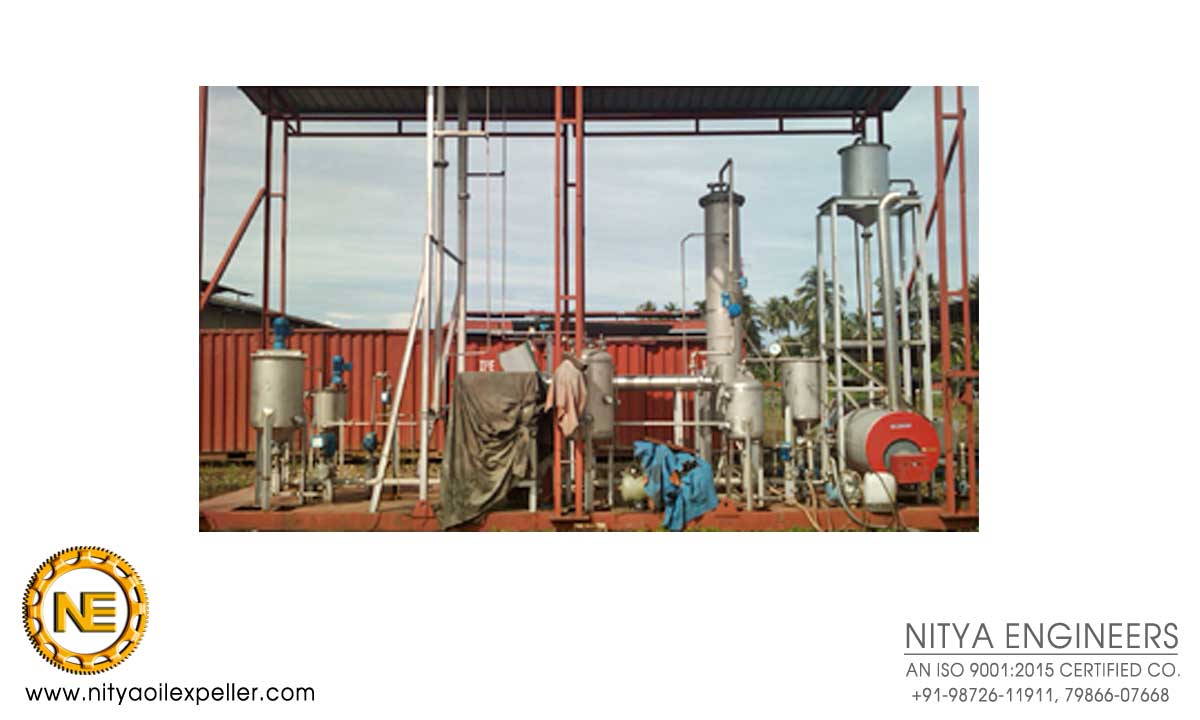Bio Diesel Plant
Nitya Engineers are the manufacturers & exporters of Bio Diesel Plant in India Punjab Ludhiana.
What Is Biodiesel?
It is a clean burning alternative fuel, produced from domestic, renewable resources. Biodiesel contains no petroleum, but it can be blended at any level with petroleum diesel to create a biodiesel blend. It can be used in compression-ignition (diesel) engines with little or no modifications. Biodiesel is simple to use, biodegradable, nontoxic, and essentially free of sulfur and aromatics.
The vegetable oils that can be used to make biodiesel - rapeseed, palm tree, olive, peanut, soy bean, safflower, sunflower, castor, etc. The non-edible oils are obtained from the seeds of the tree species.
Important tree borne oilseed (TBOs) species are Neem (Azardirchta indica), Karanj (Pongamia pinnata), Mahua (Madhuca species), Undi (Calophyllum inophyllum) and Jatropha (Jatropha curcas).
What Are The Advantages Of Biodiesel?
- The higher cetane number of biodiesel compared to petro-diesel indicates potential for higher engine performance. Tests have shown that biodiesel has similar or better fuel consumption, horsepower, and torque and haulage rates as conventional diesel
- The superior lubricating properties of biodiesel increases functional engine efficiency
- Their higher flash point makes them safer to store
- The biodiesel molecules are simple hydrocarbon chains, containing no sulfur, or aromatic substances associated with fossil fuels
- They contain higher amount oxygen (up to 10%) that ensures more complete combustion of hydrocarbons
Biodiesel offers safety benefits over petroleum diesel because it is much less combustible, with a flash point greater than 150°C, compared to 77°C for petroleum diesel. It is safe to handle, store, and transport.
Is Biodiesel A Raw Vegetable Oil?
Biodiesel is produced from any fat or oil such as soybean oil, through a refinery process called transestrification. This process is a reaction of the oil with an alcohol to remove the glycerin, which is a by-product of biodiesel production.
Can Biodiesel Be Used As A Pure Fuel Or After Blending With Petroleum Diesel?
Biodiesel can be used as a pure fuel or after blending with petroleum in any percentage. Biodiesel refers to the pure fuel before blending with diesel fuel. Biodiesel blends are denoted as, "BXX" with "XX" representing the percentage of biodiesel contained in the blend (ie: B20 is 20% biodiesel, 80% petroleum diesel).
Can Biodiesel Help Mitigate "Global Warming"?
A 1998 biodiesel lifecycle study, jointly sponsored by the US Department of Energy and the US Department of Agriculture, concluded biodiesel reduces net CO2 emissions by 78 percent compared to petroleum diesel. This is due to biodiesel's closed carbon cycle. The CO² released into the atmosphere when biodiesel is burned is recycled by growing plants, which are later processed into fuel.
Is Biodiesel Safer Than Petroleum Diesel?
Scientific research confirms that biodiesel exhaust has a less harmful impact on human health than petroleum diesel fuel. Biodiesel emissions have decreased levels of polycyclic aromatic hydrocarbons (PAH) and nitrated PAH compounds that have been identified as potential cancer causing compounds.
Do I Need Special Storage Facilities?
In general, the standard storage and handling procedures used for petroleum diesel can be used for biodiesel. The fuel should be stored in a clean, dry, dark environment. Acceptable storage tank materials include aluminum, steel, fluorinated polyethylene, fluorinated polypropylene and Teflon. Copper, brass, lead, tin, and zinc should be avoided.
NITYA ENGINEERS can provide complete solutions for the
- Assist in the Technology for the Nursery, Plantation of Jatropha, Karanj and other Tree Borne Oils.
- Extraction of oils for Bio diesel from Vegetable Oils and Tree Borne Oils seeds.
- Trans esterifcation Systems for conversion of Oils to Biodisel
Enquiry Form Contact Us
